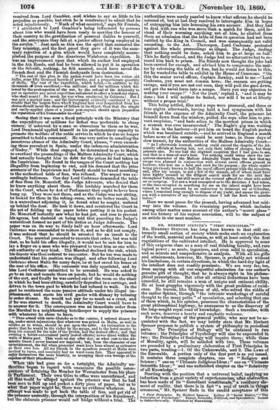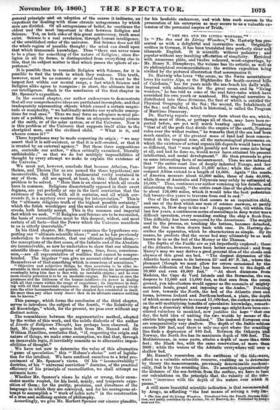MR. HERBERT SPENCER'S "FIRST PRINCIPLES."
ME. HERBERT SPENCER has long been known to that still ex- tremely small section of society which seeks such an explanation of the world, material and human, as will at least satisfy the first requisitions of the cultivated intellect. He is approved to some of this exiguous class as a man of real thinking faculty, ana rare logical power ; as acute, ingenious, and even solid in speculation, and as minute and comprehensive in analysis. With all his gifts and attainments, however, Mr. Spencer, is probably not without his limitations, in certain directions, in which the hard dry light of the intellect does not readily penetrate. We are very far, too, from saying with all our respectful admiration for our author's genuine gift of thought, that he is always right in his philoso- phical prescriptions. But after all critical deductions have been conceded, he still remains a man of unique and eminent ability. He at least grapples vigorously with the great problem of exist- ence. He travels, like Uidipus of old, who •solved the riddle of the earlier Sphinx, through " the intricate wanderings of careful thought to the many paths " of speculation, and selecting that one of them which, in his opinion, possesses the characteristics of the great philosophical highway, he announces to us the discovery of the long-sought royal road of knowledge. Such a traveller, with such news, deserves a hearty and emphatic welcome.
For the advantage of the general public, who may not be ac- quainted with the fact, we may briefly state that Mr. Herbert Spencer proposes to publish a system of philosophy in periodical parts. The Principles of Biology will be contained, in two volumes ; the Principles of Psychology will also be expounded in two ; the Principles of Sociology will require three ; while those of Morality, again, will be satisfied with two. These volumes are preceded by a preliminary elaboration of First Principles in two parts, treating-1. Of the Unknowable, and 2. The Laws of the Knowable. A portion only of the first part is as yet issued. It contains three complete chapters, one on " Religion and Science ; " one on " Ultimate Religious Ideas ; " one on " Ultimate Scientific Ideas ; " and one unfinished chapter on the " Relativity of all Knowledge."
Starting with the position that a universal belief, implying an induction from a great variety of experiences has, after abstraction has been made of its " discordant constituents," a residuary ele- ment of reality, that there is in fact "a soul of truth in things erroneous," Mr. Spencer finds in the candid acceptance of this
• First Principles. By Herbert Spencer. Author of "Social Statics," " The Principles of Psychology." Essays, Scientific, Political, and Speculative. Issued to Subscribers only. Published by Manwaring.
general principle and an adoption of the course it indicates, an expedient for dealing with those chronic antagonisms by which men are divided. Of all antagonisms of belief, he continues the oldest and the most important is that between Religion and Science. Yet, on both sides of this great controversy, truth must exist. Science is a real revelation, through human intelligence, of the established order of the universe. But Science does not fill the whole region of possible thought ; the mind can dwell upon that which transcends knowledge. Thus "there can never cease to be apiece for something of the nature of Religion ; since Re- ligioia in all its forms, is distinguished from everything else in this, that its subject matter is that which passes the sphere of ex- perience." It is possible then to reconcile Religion with Science, for it is possible to find the truth in which they coalesce. This truth, however, must be no concrete or special truth. It must be the largest fact within our mental range, a fact which Science and Religion alike agree to recognize ; in short, the ultimate fact in our intelligence. Such is the conclusion of the first chapter in Mr. Spencer's exposition. In the second chapter, our author endeavours to demonstrate that all our comprehensive ideas are partialand incomplete, and that inadequately representing objects which exceed a certain magni- tude or complexity, ' we habitually mistake our symbolic concep- tions for real ones." Thus we may form an adequate mental pic- ture of a pebble, but we cannot form an adequate mental pietare of the earth, or of the solar system, or of the Universe. Now it is this problem of the Universe that suggests itself alike to the aboriginal man, and the civilized child. " What is it, and whence comes it ?"
Three hypotheses may be made respecting its origin ; " we may assert that it is self-existent, or that it is self-created, or that it is created by an external agency." But these three suppositions are, contends our author, when critically examined, literally unthinkable ;" so that we do but multiply impossibilities of thought by every attempt we make to explain the existence of the Universe."
We must not, however, conclude that because Atheism, Pan- theism, and Theism (for so are named the three hypotheses) are inconceivable, that there is no fundamental verity contained in any of them. All are agreed, at least, in this ; that there is a problem to be solved. " Here then is an element which all creeds have in common. Religions diametrically opposed in their overt dogmas, are yet perfectly at one in the tacit conviction that the existence of the world, with all it contains, and all which sur- rounds it, is a mystery ever pressing for interpretation." This is the "ultimate religious truth of the highest possible certainty," which the fetish worshipper and the most stoical critic of human creeds, both latently accept. This is the common and imperial fact which we seek. "If Religion and Science are to be reconciled, the basis of reconciliation must be this deepest, widest, and most certain of all facts—that the Power which the Universe manifests to us is utterly inscrutable." In his third chapter, Mr. Spencer examines the hypotheses res- pecting our " ultimate scientific ideas ; " and as he has previously undertaken to demonstrate, that our ultimate religious ideas,— the conceptions of the first cause, of the Infinite and of the Absolute are inconceivable, so now he undertakes to show that our ultimate scientific ideas—the conceptions of space, time, force, conscious- ness,—are all representative of realities that cannot be compre- hended. The inquirer " can elm no account either of sensations themselves or of that something which is conscious of sensations."
" Objective and subjective things, he thus ascertains to be alike in- scrutable in their substance and genesis. In all directions, his investigations eventually bring him face to face with an insoluble enigma ; and he ever more.clearly perceives it to be an insoluble enigma. 11e learns at once the greatness and the littleness of the human intellect—its power in dealing with all that comes within the range of experience ; its impotence in deal- ing with all that transcends experience. He realizes with a special vivid- ness the utter incomprehensiveness of the simplest fact considered in itself. He more than any other truly knows that in its ultimate essence nothing can be known."
This passage, which forms the conclusion of the third chapter, serves to introduce the subject of the fourth, " the Relativity of all Knowledge," which, for the present, we pass over without any distinct notice.
The resemblance between the argumentative method, adopted by the writer of this work, and the subtle dialectic of the author of Limits of Religions Thought, has perhaps been observed. In fact, Mr. Spencer, who quotes both from Mr. Manse! and Sir William Hamilton, concludes that, " if, respecting the origin and nature of things, we make some assumption, we find that, through an inexorable logic, it inevitably commits us to alternative impos- sibilities of thought." We have not now to determine the value of this alternative " game of speculation." this " Hobson's choice" sort of legislae lion for the intellect. We have confined ourselves to a brief pre- sentment of Mr. Spencer's views. Of his " inconceivability " doctrine, of his " universal conviction" doctrine, of the practical efficiency of his principle of reconciliation, we shall attempt no estimate here.
Whether Mr. Spencer's views be right or wrong, their enun- ciator merits respect, for his lucid, manly, and temperate expo- sition of them ; for the purity, precision, and directness of the language in which they are conveyed, and for his courageous at- tempt to accomplish a work of noble note " in the construction of a true and sufficing system of philosophy. Accordingly, we give Mr. Herbert Spencer our sincere plaudits, for his laudable endeavour, and wish him such success in the prosecution of his enterprise as may secure to us a valuable ex- tension of the perennial empire of Truth.



























 Previous page
Previous page